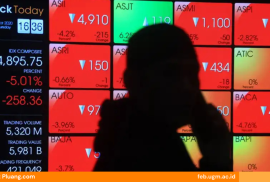During this time of the Covid-19 pandemic, the virtual world has become much busier than ever before. This has happened as a result of more and more people having turned to using their gadgets and computers as a means of survival in order to substitute various in-person activities. These changes in society have had an impact on economic development by accelerating its digital transformation. Regarding the topic of discussion, Prof. Sri Adiningsih, M.Sc., Ph.D., as Professor of Economics at Faculty of Economics and Business UGM, delivered a lecture titled “Covid-19 Impact on Digital Economy: Indonesian Case” on Tuesday (27/07) as part of the International Week 2021 (IWEEK 2021) virtual summer program.
On this occasion, broadly speaking, Prof. Sri Adiningsih discussed the impact of the Covid-19 pandemic on the digital economy. Based on year to year data, the Covid-19 pandemic has increased unemployment and poverty rates. However, we can be grateful that when the pandemic hit Indonesia, digital transformation actually developed and even disrupted business and economy. The development of the digital economy that has been present around us, for example, such as in various forms of e-commerce and also financial technology (fintech) services have become increasingly prevalent among the public. Therefore, it can be said that the digital economy is developing and the pandemic is accelerating the development of the digitalization of the economy.
Furthermore, Prof. Sri Adiningsih explained several points on how the Covid-19 pandemic crisis can accelerate digital transformation. First, the drive to reduce in-person interactions during the Covid-19 pandemic has prioritized digitalization and automation. Second, since the onset of the pandemic, digitalization and automation have been sought to be accelerated, partly because their adoption helps reduce the need for physical contact. In addition, Prof. Sri Adiningsih also mentioned that even in a crisis that hit a global scale, the pandemic has also led to a further acceleration of digital transformation globally.
In her next discussion, Prof. Sri Adiningsih also added another thing to note, which is an increase in micro firms and firms in the manufacturing sector that have adopted the use of digital platforms by 59% since October 2020. According to her, Covid-19 has prompted consumer and business behavior shifts, many of which will persist to varying degrees over the long term. There were 4 sectors that are estimated to be in high demand in the post-Covid era, namely the Education sector whose access is increasingly widespread thanks to online learning innovations, the Healthcare sector which continues to develop with technological developments, the Fintech sector where digital lending and online investment are gaining momentum, and the e-Commerce sector where the number of online shoppers has surged in this pandemic era.
At the end of the discussion, she concluded that the transformation of the digital economy has grown rapidly in the last decade and the pandemic has accelerated the process. The online lifestyle will stay, some will be run using mixed methods (online and offline) after the pandemic era. Within a decade or two, the digital economy will develop more broadly, all economic sectors in all regions will be digitized. Existing businesses should anticipate and adjust if they want to survive and grow.
Reportage: Kirana Lalita Pristy.



